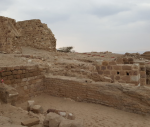US aviation authorities banned carrying toothpaste on planes heading to the Sochi Winter Olympics for fear they might contain a deadly explosive. Apparently such is the creativity of the modern terrorist.
Other departments of the US government rather more seriously worry about the transfer of nuclear materials to a terrorist group fit for an improvised “dirty bomb” (where explosives are wrapped with radiological materials) capable of bringing panic to a city, although it would only destroy not more than a block.
Some go further and fear a small nuclear bomb could be smuggled in.
Is there really something to worry about?
Presidents say they are, especially the nuclear bomb.
George W. Bush warned in one speech that rogue states “could provide weapons of mass destruction to terrorists, giving them the means to match their hatred”.
In her attempt to rally support for the decision to invade Iraq and topple Saddam Hussein, then secretary of state Condoleezza Rice said: “Terrorists might acquire such weapons from Saddam Hussein’s regime to mount a future attack far beyond the scale of 9/11.” (She said this, having no proof that Iraq actually possessed nuclear weapons.)
More recently, Barack Obama said: “The American people face no greater or more urgent danger than a terrorist attack with a nuclear weapon.”
Perspective! Perspective!
September 11 was carried out in a pretty old-fashioned way: a kamikaze attack popularised by the Japanese World War II. It would be a mind-boggling step to think terrorists could leap from September 11 to a nuclear weapon.
Some of the arguments against this likelihood are presented in an article in the latest issue of Harvard University’s “International Security”, written by professors Keir Lieber and Daryl Press.
— If for some way-out reason a state did not fear US retaliation why would it outsource the job of attack to some terrorist group?
— A state sponsor would worry that having given a terrorist group a weapon it might use it against a target that was not intended.
— Tracing culpability after an attack would not be difficult; 97 per cent of terrorist incidents are traced back to their perpetrators. And these are mainly small acts. The percentage is much higher for larger attacks.
Moreover, few countries sponsor terrorist groups.
— Iran is the worst offender and that is not a nuclear weapon producing country. Pakistan, which has nuclear weapons, only sponsors smallish terrorist groups supporting the Taliban or the fighters in Kashmir, neither of whom could serve their purpose by using a nuclear weapon.
Besides, it would be more than obvious where they got it from. If Iran gave Hizbollah or Hamas the bomb (which it does not have), Israel with its superb intelligence service that has infiltrated Hizbollah right up to almost the top, would be down on Iran like a tonne of bricks.
— Passing a nuclear bomb to a terrorist group would be a risky undertaking. A state that did this would be wagering its life against high odds.
— If a state tried to do this, it would have to find a group with the demonstrated capability of carrying out complex operations across international borders. Perhaps one group, Al Qaeda, could do this. But Al Qaeda has no state sponsor. It has no source of nuclear materials.
— The US State Department reckons there are 51 foreign terrorist organisations. Nine of them have had state sponsors and only three of these are active: Cuba, Iran and Syria. (North Korea is not on the list.) Such a small group is easy to monitor.
This is a formidable list of reasons why the US should not worry, but there are counterarguments:
— There are said by some to be “loose nukes” around, principally available because of theft from badly guarded ex-Soviet Union stockpiles. However, earlier fears have not stood up to scrutiny. Some lowly enriched uranium was stolen, but not a bomb itself, and obviously not the technology to fashion a bomb. Nearly all the stolen uranium has been tracked down.
— It is argued that tracing the source of an explosion carried out by terrorists would be exceedingly difficult. It would not. Even adversaries of the US would quickly want to prove they were innocent and would cooperate in every way, including detailed inspections. No state would put itself in a situation where there could be an assumption of guilt followed by massive retaliation.
Bush’s, Rice’s and Obama’s fears are overblown. But why do they attempt to rattle public opinion? A better rhetoric would be to play down the danger of such an attack, stressing how capable the US would be in tracing one, and warning a possible rogue state that it would bring down the roof on itself if it were found culpable of passing a nuclear weapon to terrorists.













